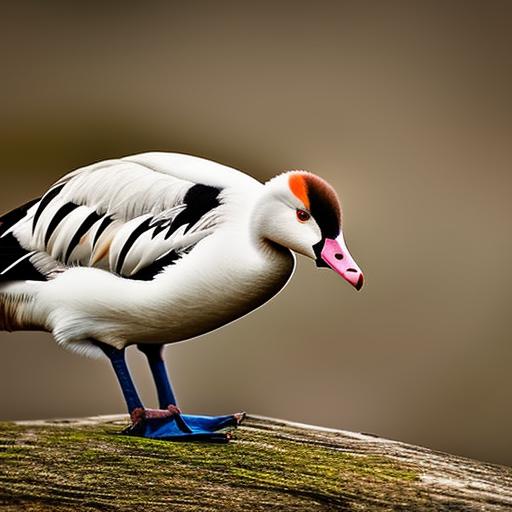Chinese Geese, also known as Swan Geese, are a domesticated breed of geese that originated in China. They have a long and rich history, dating back thousands of years. Chinese Geese were originally bred for their meat and feathers, and they were highly valued for their ability to guard and protect livestock. Today, Chinese Geese are popular not only for their practical uses but also as pets and ornamental birds.
Chinese Geese are known for their distinctive appearance. They have a graceful and elegant posture, with a long neck and a slender body. They have a white plumage with black markings on their wings and tail. One of the most unique features of Chinese Geese is their knob, which is a fleshy protuberance on the top of their beak. This knob is more prominent in males than in females and is used for display during courtship.
Key Takeaways
- Chinese geese are a domesticated breed of waterfowl that are known for their distinctive appearance and docile temperament.
- When housing Chinese geese, it is important to provide them with a secure and spacious enclosure that includes access to water for swimming and drinking.
- Chinese geese require a balanced diet that includes a mix of grains, greens, and protein sources, as well as access to clean water at all times.
- To maintain the health of Chinese geese, it is important to provide regular veterinary care and monitor for common health issues such as respiratory infections and parasites.
- Breeding Chinese geese can be a rewarding experience, but it is important to carefully select breeding pairs and provide appropriate nesting materials and conditions.
Housing and Enclosure Requirements for Chinese Geese
Chinese Geese require a suitable living environment to thrive. They need ample space to roam and graze, as well as access to water for swimming and bathing. A secure enclosure is essential to protect them from predators and to prevent them from wandering off.
There are several types of enclosures that are suitable for Chinese Geese. A fenced-in yard or pasture is ideal, as it allows them to graze freely while still providing protection. The enclosure should be at least 100 square feet per goose, with a minimum height of 3 feet to prevent them from flying over the fence.
Maintaining a clean and safe living environment is crucial for the health and well-being of Chinese Geese. Their enclosure should be cleaned regularly to remove droppings and other debris. Providing fresh bedding, such as straw or wood shavings, will help keep the area clean and comfortable for the geese.
Feeding and Nutrition Guidelines for Chinese Geese
Chinese Geese have specific dietary needs that must be met to ensure their health and vitality. They are herbivores and primarily feed on grass, weeds, and other vegetation. However, they also require supplemental feed to meet their nutritional requirements.
A balanced diet for Chinese Geese should consist of a mix of grains, such as corn and wheat, along with fresh fruits and vegetables. They should also have access to clean water at all times for drinking and bathing.
It is important to provide Chinese Geese with the right amount of food to prevent overeating or malnutrition. Feeding them twice a day, in the morning and evening, is recommended. The amount of food will depend on the size and age of the geese, as well as their activity level.
Health and Veterinary Care for Chinese Geese
Like any other animal, Chinese Geese are susceptible to certain health issues. It is important to be aware of these common ailments and take preventative measures to maintain good health in your geese.
Some common health issues in Chinese Geese include respiratory infections, parasites, and foot problems. Respiratory infections can be caused by poor ventilation or exposure to cold and damp conditions. Regular cleaning of the enclosure and providing adequate ventilation can help prevent respiratory infections.
Parasites, such as mites and worms, can also affect Chinese Geese. Regular deworming and treating the geese for external parasites can help keep them healthy. Foot problems, such as bumblefoot, can occur if the geese are kept on hard or rough surfaces. Providing a soft bedding material and regular foot checks can help prevent foot problems.
Finding a good veterinarian who is knowledgeable about geese is essential for the health and well-being of your Chinese Geese. They can provide vaccinations, perform routine check-ups, and offer advice on preventative care.
Breeding and Reproduction of Chinese Geese
Chinese Geese are monogamous and form strong pair bonds. They typically mate for life and will only choose a new mate if their partner dies. During the breeding season, which usually occurs in the spring, the male will perform a courtship display to attract a female.
The female will lay a clutch of eggs, usually around 5-10, and will incubate them for about 28-30 days. It is important to provide a suitable nesting area for the female, such as a secluded spot with soft bedding material. The eggs should be checked regularly for fertility and any damaged or infertile eggs should be removed.
Once the goslings hatch, they should be kept with their parents for at least 6-8 weeks to ensure proper bonding and socialization. During this time, they should have access to a brooder or warm area to keep them safe and comfortable.
Behavioral Characteristics of Chinese Geese

Chinese Geese are highly social birds and thrive in the company of other geese. They form strong bonds with their flock mates and will often display protective behavior towards each other. They are also known for their alertness and will sound an alarm if they sense danger.
Communication among Chinese Geese is primarily through vocalizations. They have a loud honking call that can be heard from a distance. They also use body language, such as head bobbing and wing flapping, to communicate with each other.
Chinese Geese have some unique behavioral traits that set them apart from other breeds of geese. One of these traits is their strong instinct to guard and protect their territory. They will often chase away intruders, including other animals or humans, to defend their flock.
Tips for Handling and Taming Chinese Geese
Handling Chinese Geese can be challenging, especially if they are not used to human contact. However, with patience and gentle handling, they can become tame and friendly.
When handling Chinese Geese, it is important to approach them slowly and calmly. Sudden movements or loud noises can startle them and cause them to become aggressive. It is also important to avoid grabbing or restraining them forcefully, as this can cause them to panic.
To tame Chinese Geese, it is important to spend time with them on a regular basis. This can include feeding them by hand, talking to them softly, and offering treats as rewards for good behavior. Over time, they will become more comfortable with human contact and will be easier to handle.
Socializing Chinese Geese is also important for their overall well-being. They should be introduced to other geese at a young age to help them develop social skills and establish a pecking order within the flock.
Common Challenges and Solutions in Keeping Chinese Geese
Keeping Chinese Geese can come with its own set of challenges. It is important to be prepared for these challenges and have solutions in place to overcome them.
One common challenge faced by Chinese Geese owners is their tendency to be noisy. Chinese Geese are known for their loud honking calls, which can be disruptive in residential areas. Providing a quiet and secluded area for the geese, such as a backyard or farm, can help minimize noise disturbances.
Another challenge is their territorial behavior. Chinese Geese can be aggressive towards other animals or humans that they perceive as a threat to their flock. Proper training and socialization from a young age can help minimize aggressive behavior.
Overcoming these challenges requires patience, consistency, and a good understanding of the breed’s behavior and needs. Seeking advice from experienced Chinese Geese owners or joining local organizations or clubs can also provide valuable support and guidance.
Benefits of Raising Chinese Geese on the Farm
Raising Chinese Geese on the farm can have several benefits, both economically and environmentally.
From an economic standpoint, Chinese Geese can be a profitable venture. They are highly valued for their meat, which is lean and flavorful. Their feathers can also be used for various crafts and products, providing an additional source of income. Additionally, Chinese Geese can be sold as pets or ornamental birds, further adding to the economic benefits.
From an environmental perspective, Chinese Geese can be beneficial for pest control. They have a natural instinct to graze on grass and weeds, which can help keep the vegetation in check. This can reduce the need for chemical herbicides and promote a more sustainable farming practice.
Consuming Chinese Geese products can also have health benefits. Their meat is low in fat and high in protein, making it a healthy choice for those looking to maintain a balanced diet. Additionally, their eggs are rich in nutrients and can be a nutritious addition to any diet.
Resources for Further Information on Chinese Geese
For those interested in learning more about Chinese Geese, there are several resources available.
Online resources such as websites and forums dedicated to poultry keeping can provide valuable information on the care and management of Chinese Geese. These resources often include articles, videos, and discussion boards where owners can share their experiences and ask questions.
Books and publications on poultry keeping may also have specific chapters or sections dedicated to Chinese Geese. These resources can provide in-depth information on the breed’s history, behavior, and care requirements.
Local organizations and clubs for poultry owners may also have resources and support for those interested in raising Chinese Geese. These organizations often hold events, workshops, and seminars where owners can learn from experts in the field.
By utilizing these resources and seeking advice from experienced Chinese Geese owners, you can ensure that you have the knowledge and support needed to successfully raise and care for these beautiful birds.
If you’re interested in keeping Chinese geese, you may also want to check out this informative article on the Producers Pride Sentinel Chicken Coop from Poultry Wizard. This coop is designed to provide a safe and comfortable environment for your geese, ensuring their well-being and productivity. With its durable construction and convenient features, the Producers Pride Sentinel Chicken Coop is a great option for anyone looking to raise Chinese geese. To learn more about this coop, click here.
FAQs
What are Chinese geese?
Chinese geese are a domesticated breed of geese that originated in China. They are known for their distinctive appearance, with a long, slender neck and a prominent knob on their forehead.
What do Chinese geese eat?
Chinese geese are primarily herbivores and feed on grasses, weeds, and other vegetation. They also enjoy fruits and vegetables, such as apples and carrots, and can be supplemented with commercial poultry feed.
How do you keep Chinese geese?
To keep Chinese geese, you will need a secure and spacious outdoor enclosure with access to water for swimming and drinking. They also require a sheltered area for protection from the elements and predators. Additionally, they need a balanced diet and regular veterinary care.
What are the benefits of keeping Chinese geese?
Chinese geese are popular for their meat, eggs, and feathers. They are also known for their ability to act as natural pest control, as they will eat insects and other small animals. Additionally, they make excellent pets and can be trained to perform tricks.
What are some common health issues for Chinese geese?
Chinese geese are susceptible to a variety of health issues, including respiratory infections, parasites, and foot problems. It is important to provide them with proper nutrition, clean living conditions, and regular veterinary care to prevent and treat these issues.
Meet Walter, the feathered-friend fanatic of Florida! Nestled in the sunshine state, Walter struts through life with his feathered companions, clucking his way to happiness. With a coop that’s fancier than a five-star hotel, he’s the Don Juan of the chicken world. When he’s not teaching his hens to do the cha-cha, you’ll find him in a heated debate with his prized rooster, Sir Clucks-a-Lot. Walter’s poultry passion is no yolk; he’s the sunny-side-up guy you never knew you needed in your flock of friends!







